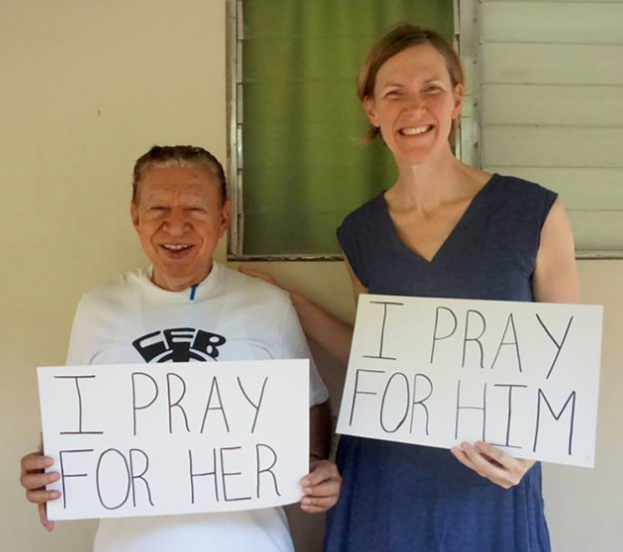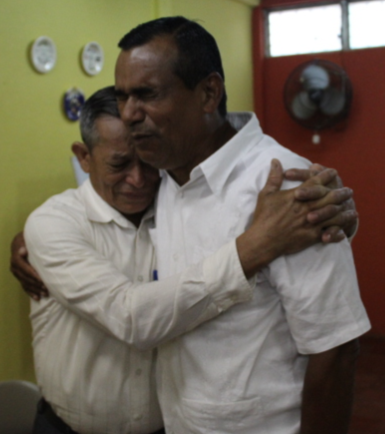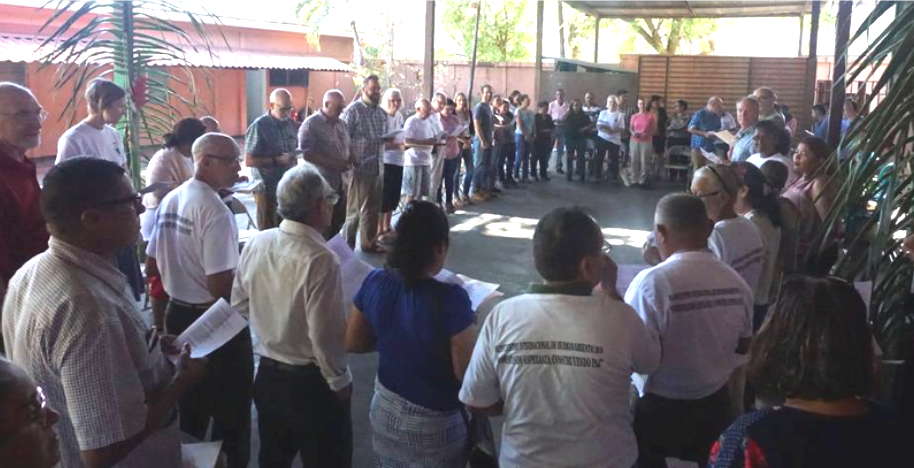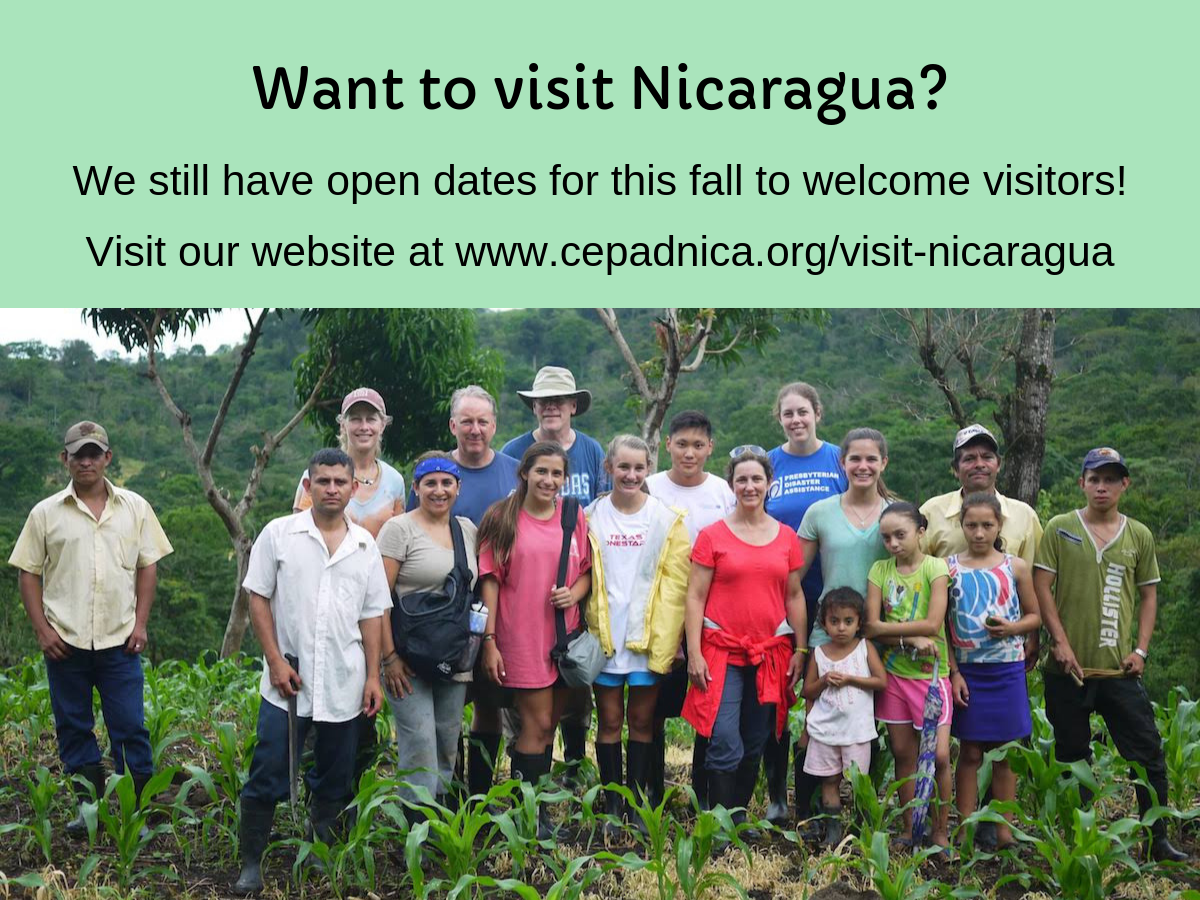A Letter from Ian and Jhanderys Dotel-Vellenga, serving in Nicaragua
June 2019
Write to Ian Vellenga
Write to Jhanderys Dotel-Vellenga
Individuals: Give online to E200391 for Ian and Jhanderys Dotel-Vellenga’s sending and support
Congregations: Give to D507593 for Ian and Jhanderys Dotel-Vellenga’s sending and support
Churches are asked to send donations through your congregation’s normal receiving site (this is usually your presbytery).
One of the most important aspects of ministry is just showing up. While in seminary, both Jhan and I took classroom courses about chaplaincy, particularly about chaplaincy in a hospital setting. In those courses, there was a lot of emphasis on different perspectives of chaplaincy: for example, the dynamics of family systems and how those might affect how a chaplain ministers to a person in need. We also talked about respecting people’s different religious traditions. If people don’t follow any particular religion, our role as chaplains is not to convert them, but to provide comfort.
Although wide in scope, chaplaincy focuses on the intellectual, emotional, social, cultural and spiritual dimensions of a person or community, and it focuses on a ministry of presence. In the hospital, we often experienced people feeling lonely and isolated, many lacking visits from family and friends, or not knowing how to cope with a bad diagnosis. Often in these situations, a non-judgmental, caring, listening heart is all that is necessary. But no matter where or in what situations chaplains are needed, the one aspect of ministry that is universally recognized throughout academia and institutions is this: in order to have an effective ministry, the most important thing to do, above all else, is to show up … to be present.
We recently had an International Encounter in Nicaragua during which members from different congregations in the United States came to meet up with their Nicaraguan partners with whom they share ministries that help to improve the living conditions of many communities. Some of the things these partnerships facilitate are educational scholarships, water filters and family gardens. This encounter was to ensure and reinforce the commitment between the Nicaraguan and American partners, and to help create a plan for each partnership for the future. Now, it is easy to look at this and say, “Well, of course that’s what you’re supposed to do. That is part of ministry.” But if you have been paying attention to the news about Nicaragua over the last year, you see how significant and important it was (and continues to be) that congregations showed up to meet with their Nicaraguan partners to provide that physical presence that was much needed; to personally reiterate their commitment and support to their local partners; and to listen to the stories face to face. During the months of crisis, some communities were completely isolated and in fear not only because of the threat of violence, but also because they lost communication with family and friends for extended periods of time. There was a lot of uncertainty and uneasiness in these communities.
The reassurance of the American partners to be with them in these troublesome times is what we call companionship: that vital connection with others that brings a sense of closeness and unity beyond class, culture and language. Companionship means to be present and support our sisters and brothers in Christ the best that we can in times of difficulty and trial. It is an awareness of the struggles and troubles of others, coupled with the desire to relieve their suffering or distress. This does not mean we need to have all the answers, or any answer at all. It simply means that we stand with others in the midst of anxiety, struggle and fear.You could say that in this modern era there are many ways to be present. In fact, technology is reshaping the ways through which we communicate and connect with others. Phone calls, emails and even video chats help to break the distance barrier. But nonetheless, to be present not just in spirit but also in body carries a meaning that no form of modern communication could ever substitute, that physical and human presence that brings about a sense of togetherness, fellowship and mutual affection …
As chaplains, we must always strive to be open-hearted and open-minded to those who need our support and care, and as Christians we are part of a community that not only prays for us, but walks with us and bears our burdens with us. So whenever and however we can, in all times let’s be present.
Months after the crises, people are still suffering the consequences: more than 150,000 jobs were lost, and many had to migrate to other countries and leave their families behind in the search for work. The people of Nicaragua need our love and support in these difficult times. You are our companions in this journey, and we are grateful for your support, prayers and financial gifts, which make an immense difference to our ministry and to the people we are working with and working for. Thanks for subscribing to our letters and for your interest in our work with CEPAD and the people of Nicaragua. We hope to see you soon.
Paz,
Jhan and Ian
![]() You may freely reuse and distribute this article in its entirety for non-commercial purposes in any medium. Please include author attribution, photography credits, and a link to the original article. This work is licensed under a Creative Commons Attribution-NonCommercial-NoDeratives 4.0 International License.
You may freely reuse and distribute this article in its entirety for non-commercial purposes in any medium. Please include author attribution, photography credits, and a link to the original article. This work is licensed under a Creative Commons Attribution-NonCommercial-NoDeratives 4.0 International License.



